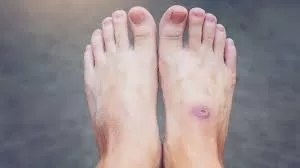As the monsoon season approaches, experts are raising alarms about the increased risk of foot ulcers among diabetic patients due to heightened moisture and humidity. Diabetic foot, a severe complication of diabetes, affects the feet due to prolonged high blood sugar levels, leading to nerve damage (neuropathy), poor blood circulation, foot ulcers, infections, and in severe cases, amputation.
Increased Risk During Monsoon
An estimated 15% of diabetics are likely to experience foot problems. While the risk persists throughout the year, the monsoon’s humidity exacerbates the condition. Dr. Shashank Joshi, an endocrinologist at Lilavati Hospital Mumbai, noted that more than 50% of people with diabetes experience foot infections during the monsoon, with those aged 50-65 and with uncontrolled diabetes being the most vulnerable.
Severe Consequences
Diabetic foot ulcers can lead to serious infections, potential amputations, and a decreased quality of life. Dr. Jaisom Chopra, a vascular surgeon at Apollo Spectra Hospitals, Delhi, emphasized the need for diabetic patients to maintain foot hygiene, undergo regular check-ups, and wear appropriate footwear to prevent ulcers during the monsoon season.
Staggering Statistics
A recent study by the Christian Medical College, Vellore, revealed a troubling increase in the number of diabetics undergoing amputations due to sores. The study also found that after one amputation, the likelihood of another amputation in the future triples.
Preventive Measures
Dr. Joshi stressed the importance of awareness and regular foot care to prevent such severe outcomes. He highlighted the need for good sugar control, proper care of nerves and blood vessels, and regular foot checks. Specialist diabetic footwear is also available and highly recommended for those living with diabetes.
Expert Advice
Dr. Joshi advised diabetic patients to take several preventive measures:
- Quit Smoking: Enhances circulation.
- Keep Feet Dry: Prevents infections.
- Avoid Walking Barefoot: Reduces risk of injuries.
- Trim Nails Regularly: Prevents ingrown nails and infections.
- Choose Good Quality Socks: Especially if wearing shoes.
- Consult Experts: In case of wounds, redness, blisters, or ulcers.
With the monsoon season posing additional risks, diabetic patients must stay vigilant about their foot health. Early intervention and preventive care are crucial in avoiding serious complications and maintaining a good quality of life.












